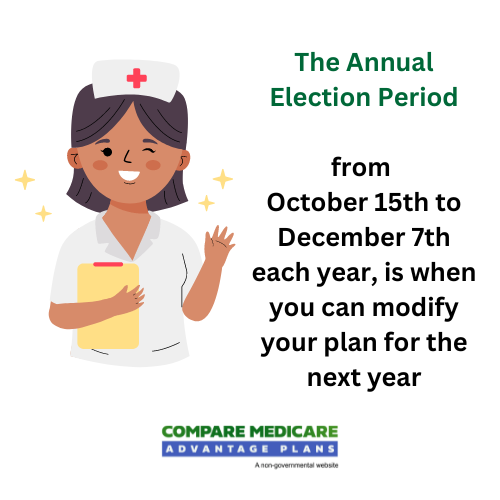Do Medicare Advantage Plans Auto Renew?
Navigating the world of Medicare Advantage plans might be complex, especially when it comes to understanding the auto-renewal process and how it could affect your healthcare coverage.
Staying informed and proactive will likely be crucial to ensuring that your Medicare Advantage plan continues to meet your health needs and fits within your budget.
This article will explore the auto-renewal process, discussing whether or not Medicare Advantage plans auto-renew, the importance of evaluating your plan annually, and possible tips for ensuring a smooth renewal experience.
This article will also discuss the Annual Enrollment Period, which is the time to make changes to your Medicare Advantage plan, as well as Special Enrollment Periods that may arise due to specific life events. Armed with this knowledge, you’ll likely be better prepared to make informed decisions about your healthcare coverage.
Key Takeaways
- It is recommended to review and make changes to Medicare Advantage plans during the Annual Enrollment Period.
- Special Enrollment Periods could provide an opportunity for adjustments due to qualifying life events.
- Keeping information up-to-date and staying informed about possible plan changes will likely be essential for a smooth auto-renewal process.
Compare Plans in One Step!
Enter Zip Code
Medicare Advantage Plans: Auto Renewal Explained
Insurance companies may offer annual auto-renewal for certain Medicare Advantage plans. This auto-renewal could potentially ensure your Medicare coverage continues into the next year, provided you pay all relevant premiums.
However, despite the potential convenience of auto-renewal, it’s wise to review your coverage and make adjustments as needed during the Annual Enrollment Period.
Although some Medicare Advantage plans may auto-renew, there could be exceptions to this rule. In certain circumstances, you may need to enroll in a new plan or return to Original Medicare.

How Auto Renewal Works
Auto-renewal for Medicare Advantage plans will likely be automatic, provided that you continue to pay your monthly premiums.
This means that if you take no action during the Annual Enrollment Period, your current plan may continue for the following year without any additional steps required on your part. However, it’s important to be aware of any potential changes to your plan’s coverage, provider networks, or costs, as these could affect your healthcare experience.
Though auto-renewal may be convenient, it’s crucial to assess your plan each year and make changes as necessary during the Annual Enrollment Period.
The Annual Enrollment Period is the time when you can switch to a different Medicare Advantage plan, return to Original Medicare, or enroll in a new Part D prescription drug plan. Keeping abreast of your plan and potential alterations could help ensure your plan aligns with your healthcare needs and budget.
Exceptions to Auto-Renewal
In some cases, your Medicare Advantage or Part D plan may not automatically renew, which could require you to enroll in a new plan. This may happen if your Medicare Advantage plan terminates its coverage or if the insurance company ceases offering it.
During the Annual Enrollment Period, which occurs between October 15 and December 7, you will have the opportunity to enroll in a new plan.
It’s essential to understand the specific circumstances that may qualify for a Special Enrollment Period, allowing you to change your Medicare coverage outside the regular Annual Enrollment Period.
These could include moving, losing health coverage, or experiencing a significant change in your healthcare needs. Being aware of these exceptions may help you maintain the right coverage and avoid disruptions in your healthcare.
Evaluating Your Medicare Advantage Plan Annually
To potentially guarantee that your Medicare Advantage plan continues to meet both your health requirements and budgetary restrictions, it is suggested to evaluate your plan on an annual basis.
This could include reviewing your plan’s coverage, provider networks, and prescription drug coverage. This may also help ensure your plan remains cost-efficient and meets your healthcare needs.
Some important factors to consider when evaluating your plan may include:
- Your health conditions
- Anticipated healthcare needs
- Preferred doctors
- Prescription medications
- Supplemental coverage options
- Potential plan benefits
- Out-of-pocket costs
Examining these aspects carefully and comparing different plans could help you make a well-informed choice about your Medicare coverage.
Possible Coverage Changes
Your current Medicare coverage, specifically the Medicare Advantage plan that may be offered by your insurance provider, might change from year to year due to modifications in the Medicare contract, including potential changes within the Medicare program itself.

It’s important to stay informed about your Medigap coverage, such as the:
- Benefits
- Provider and pharmacy networks
- Prescription drug coverage
- Cost Sharing
Staying informed about potential changes in these areas could help ensure that your plan continues to meet your healthcare needs and budget.
Some examples of coverage changes in a Medicare Advantage plan may include:
- Alterations to premiums
- Changes in out-of-pocket costs
- Updates to access to medications
- Modifications to the providers and pharmacies included in your network
Reviewing these changes annually could help you make necessary plan adjustments and potentially avoid surprises or disruptions in your healthcare.
Potential Cost Considerations
When assessing the possible cost of your Medicare Advantage plan, it’s crucial to consider some of the following factors:
- Your health status
- Your healthcare usage
- Supplemental coverage
- Plan benefits
- Monthly premium costs
- Maximum out-of-pocket costs
- Coverage and cost comparison
These factors might help you determine whether your plan remains cost-effective for your needs.
It’s also essential to understand how deductibles, copayments, and coinsurance could impact the total cost of your Medicare Advantage plan.
Staying updated about these potential costs and their impact on your out-of-pocket expenses could help you make a well-informed decision about your healthcare coverage.
Annual Enrollment Period: Making Changes to Your Medicare Advantage Plan

The Medicare Open Enrollment Period, also known as the Annual Enrollment Period, is a critical time for Medicare beneficiaries, as it allows you to make changes to your Medicare Advantage plan.
This period, which occurs from October 15 to December 7 each year, is the prime time to switch plans, return to Original Medicare, or enroll in a new Part D prescription drug plan.
It’s important to take advantage of this period to review your current plan and make any necessary changes to ensure it meets your healthcare needs and budget.
When is the Annual Enrollment Period?
The Medicare Annual Enrollment Period takes place annually from October 15 to December 7. During this period, you have the opportunity to make changes to your Medicare Advantage plan, switch to Original Medicare, or enroll in a new Part D prescription drug plan.
Utilizing this period effectively can help ensure your plan continues to meet your healthcare needs and budget.
Changing Plans During the Annual Enrollment Period
During the Annual Enrollment Period, you may make various changes to your Medicare Advantage plan. This could include:
- Transitioning to a different Medicare Advantage plan
- Transitioning from Original Medicare to a Medicare Advantage plan
- Transitioning from a Medicare Advantage plan back to Original Medicare
To change your Medicare Advantage plan during the Annual Enrollment Period, you can call one of our licensed agents at 1-833-641-4938 (TTY 711), Mon-Fri 8 am-9 pm EST.
Special Enrollment Periods: Adjusting Your Coverage Outside the Annual Enrollment Period
In addition to the Annual Enrollment Period, Medicare also offers Special Enrollment Periods, which allow you to make changes to your coverage outside of the standard enrollment window due to specific life events or circumstances.
These changes may include switching Medicare Advantage plans, enrolling in a new Part D prescription drug plan, or returning to Original Medicare.
Understanding what qualifies as a Special Enrollment Period and how to navigate these periods could help you maintain suitable coverage and avoid any potential disruptions to your healthcare.
Qualifying Life Events
Qualifying life events are specific circumstances that allow you to make changes to your Medicare coverage outside of the Annual Enrollment Period. These events may include moving to a new area, losing other health coverage, or experiencing a significant change in your healthcare needs.

Staying aware of these qualifying life events could help maintain appropriate coverage and prevent potential disruptions to your healthcare.
Navigating Special Enrollment Periods
To navigate Special Enrollment Periods, it’s essential to consult with one of our licensed insurance agents for guidance.
Our agents can help you determine whether you qualify for a Special Enrollment Period and how to make any necessary changes to your Medicare Advantage plan.
Staying updated about Special Enrollment Periods and comprehending the specific circumstances that may qualify can help ensure your healthcare coverage aligns with your needs and prevent potential disruptions.
Tips for Ensuring a Smooth Auto Renewal Process
To ensure a smooth auto-renewal process for your Medicare Advantage plan, it will likely be important to keep your personal information updated with Medicare and stay informed about any changes to your plan.
By doing so, you could potentially avoid any potential disruptions in coverage.

Keep Your Information Updated
It will likely be crucial to keep your personal information, such as your address and contact information, updated with Medicare to avoid any disruptions in coverage.
Ensuring your information is accurate might help avoid potential penalties and potentially ensure you receive important notices and information from Medicare.
Stay Informed About Plan Changes
Members may stay updated about changes to their Medicare Advantage plan by:
- Reviewing your Annual Notice of Change and other plan communications.
- Understanding any potential modifications to your plan’s coverage, service area, or costs.
- Make any necessary adjustments to ensure that your plan continues to meet your healthcare needs and budget.
Summary
Understanding the auto-renewal process for Medicare Advantage plans may be essential for ensuring that your healthcare coverage remains suitable for your needs and budget.
By evaluating your plan annually, taking advantage of the Annual Enrollment Period, and being aware of Special Enrollment Periods, you can make informed decisions about your Medicare coverage and maintain peace of mind.
By keeping your information updated, reviewing plan changes, and making any necessary adjustments, you can ensure a smooth auto-renewal process and enjoy the peace of mind that comes with having the right coverage for your needs.
Frequently Asked Questions
→ Do Medicare supplemental plans automatically renew?
A majority of the Medicare and Medicare Supplement Insurance policies may automatically be renewed each year as long as you make the monthly premium payments, so it could be a convenient way to maintain your coverage.
There may be some exceptions to automatic renewal, such as if you change plans during the Annual Enrollment Period or if you stop paying your premiums.
→ Do I still pay Medicare premiums with an Advantage plan?
When enrolling in a Medicare Advantage plan, you are still required to pay the Part B premium. In addition, you may have to pay an additional monthly premium to your Medicare Advantage plan depending on the plan you choose.
Make sure to compare plans in your area and understand their potential costs and benefits before joining.
→ Can you go back to regular Medicare after an Advantage plan?
You may switch from your Medicare Advantage Plan to Original Medicare or another Medicare Advantage Plan during the Medicare Advantage Open Enrollment Period.
To do so, contact one of our licensed agents at 1-833-641-4938 (TTY 711), Mon-Fri 8 am-9 pm EST. If you join a Medicare Advantage Plan during your Initial Enrollment Period, you may also have the option to change to another Medicare Advantage Plan or go back to Original Medicare within the first 3 months.
→ Which Medicare is automatic?
Automatic enrollment into Medicare is available when you turn 65. You should automatically receive Part A, and if you’re receiving Social Security benefits, Part B as well. To avoid any late enrollment penalties, make sure to sign up for Part B within three months of your birthday.
→ When does the Annual Enrollment Period take place?
The Annual Enrollment Period takes place annually from October 15 to December 7 each year.

ZRN Health & Financial Services, LLC, a Texas limited liability company



